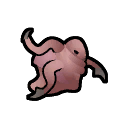Fleshbeasts
| This article relates to content added by Anomaly (DLC). Please note that it will not be present without the DLC enabled. |
| Spoiler warning: This page may contain details about the gameplay that might be considered spoilers. If you wish to enjoy the content first hand, you probably shouldn't continue reading beyond this point. |
| This article is a stub. You can help RimWorld Wiki by expanding it. Reason: Please add a reason . |
| This page has been suggested for recoding. Reason: Pawnkind table, see Insectoids#Pawns and Mechanoid hive#Pawns for example. You can help RimWorld Wiki by improving it. |
Fleshbeasts
Hideous creatures composed of masses of cancerous flesh. Some contain multiple nervous systems, allowing them to split into smaller fleshbeasts.
Base Stats
- Type
- Entity
Fleshbeasts are a wide-ranging category of entity, added by the Anomaly DLC. They include the following specific subtypes:
Occurrence
| This section is a stub. You can help RimWorld Wiki by expanding it. Reason: Distress signal. |
Fleshbeasts are found, often in great numbers, above and below ground. When they appear, due to a natural event or a summoning ritual, they will appear from pits in the earth. They can also be found en masse underground inside the caverns beneath a Pit gate, including the fearsome Dreadmeld. Other, more obscure appearances include being found inside the labyrinth of a Warped obelisk, the result of removing a "flesh" body part, a random mutation of wildlife by the twisted obelisk, or emerging from a creepjoiner. Fleshbeasts can also be found inside ancient dangers.
Summary
Fleshbeasts come in five different forms, not including the related Fleshmass heart. They are generally easy enough to dispatch on their own, but they become dangerous in numbers. All of them, save the Toughspike, either dissolve into flesh or split into smaller fleshbeasts upon death and often on being downed.
Combat
Fleshbeasts utilize strength in numbers, and as such, precautions should be taken to not be overwhelmed: AOE attacks, like Frag grenades and Molotov cocktails, work well, and the minigun may be a good choice for dense hordes. They are especially weak to fire, and so fire weapons are a very good, if risky, option when dealing with them. When raiding a pit gate, the fleshy terrain is also flammable, which can be a boon when fighting its denizens.
If close enough, large fleshbeasts can often fling their progeny over your formation when splitting, leading to potential havoc among your ranged pawns. If possible, try and keep them surrounded by melee pawns to protect them.
Trispikes, Fingerspikes and Toughspikes have a ranged attack, though it is rarely used, very short ranged, and fired with poor aim.
Analysis
With the exception of the Dreadmeld, Fleshbeast fights are generally rather mild, as long as you have enough melee fighters, which is more important than ever in Anomaly.
Importantly, care should be taken to prevent too many fleshbeasts from engaging at once. Attacking those that cannot split upon death, such as the fingerspike and toughspikes, should generally be a priority. This will limit the amount of enemies a colony will face at a given time. Also, the ranged attacks most fleshbeasts have tend to be used right after they spawn, which can significantly increase the amount of oncoming DPS a group of fighters must withstand. Taking enemies out directly after they spawn can prevent this attack and is much more achievable against fewer entities.
Interestingly, fleshbeasts are one of the few entity types that are vulnerable to hypothermia and frostbite, making it possible to kill them or remove limbs with a freezer. A toughspike or a finger spike can be downed permanently by removing its limbs, making it impossible for the entity to escape. This may also be possible with a bulbfreak or trispike however taking too much damage will cause these to split into smaller fleshbeasts so actually causing enough limb damage before they split may be impossible.
Version history
- Anomaly DLC Release - Added.
